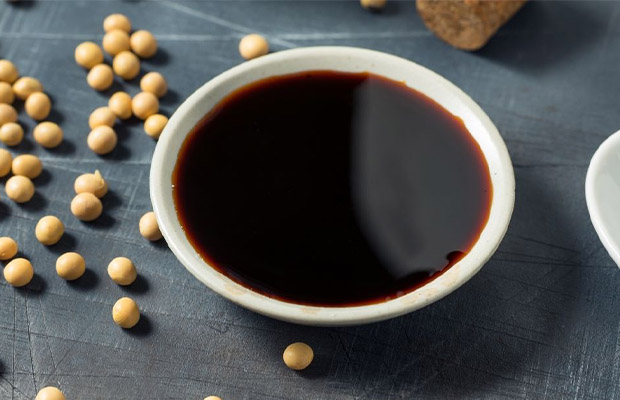Does soy sauce need to be refrigerated? You don’t have to refrigerate soy sauce, but it’s quite beneficial to do so, especially if it is stored for long periods of time. Since refrigeration keeps the flavor and quality characteristics at their peak for a longer period of time, eating it without refrigeration may result in some quality aspects being lost.
Here is a brief overview of storage, shelf life, and signs of bad soy sauce.
What Is Soy Sauce?
It helps to consider how and what is used in the preparation of any condiment in order to determine how to store it. The majority of soy sauce brands on the market share the same four ingredients: soybeans, a roasted grain (typically wheat), salt, and a fermenting agent (typically koji, a mold also used to make miso, shochu, and sake). There are a huge number of soy sauce brands available for purchase. Although each brewer uses essentially the same ingredients, soy sauce can take on a variety of characteristics and flavors, much like wine.
Brewers cook soybeans in water, blend the soybeans with roasted grain, add the koji culture, and then add a salt brine. Before straining, pasteurizing, and bottling, they put the soy sauce through two stages of fermentation and an aging process (the secondary fermentation and aging process are where the most flavor develops).
Does Soy Sauce Go Bad?
While soy sauce doesn’t easily go bad, its quality doesn’t last indefinitely either. Unopened bottles last for a few years past the printed expiration date; however, once opened, the condiment only retains its excellent quality for about a month at room temperature and possibly half a year in the refrigerator.
Naturally, your soy sauce will continue to be fine to use after that time, with only a slight flavor degradation.
That means the best thing to do if you have an old open bottle that has been sitting in storage for months is to check its taste if it doesn’t show any signs of spoilage (more on that in a second).
As mentioned on the Kikkoman’s website, soy sauce won’t spoil “as long as no water or other ingredients have been added.” That means that keeping it tightly closed prevents it from going bad in most cases.
Let’s say you noticed some floating objects that resemble yeast and that you wanted to know what they were before throwing the soy sauce away. It’s advantageous that these don’t spoil soy sauce (though they might change the flavor).
White Floaties
Despite appearing to be mold, this white floating substance is actually film yeast, a type of yeast that can flourish even in extremely salty conditions (such as those found in soy sauce). Although this film yeast doesn’t make you sick, it could ruin the sauce’s flavor and aroma.
Here’s how you deal with the white floaties situation:
- Taking out the white floaties, such as, using coffee filters or something similar.
- After removing the film yeast, taste your soy sauce to make sure it tastes good. If not, discard it.
Signs Of Spoilage
Sniff it and closely examine the liquid to determine if your soy sauce has gone bad. Look for anything on the surface, like mold (aside from film yeast, which you can remove), off-putting, funny, or extremely strong odors, changes in color or texture, and any changes in shape.
If your soy sauce appears to be in good shape and smells pleasant, taste it to determine whether it is suitable for use.
You must understand how soy sauce changes over time to perform the aforementioned tasks effectively.
Color and flavor are the two changes that are most significant. While the taste slowly fades away, the color gradually gets stronger.
Of course, if the flavor is a little less strong than it used to be, simply adding a little more soy sauce usually fixes the problem. (while also assisting you in using it up faster.)
However, if there is little flavor left or it simply tastes bad, it must be removed.
The last piece of advice is to err on the side of caution and throw away any soy sauce that you aren’t absolutely certain is safe to consume. particularly if you didn’t adhere to good storage principles.
Does Soy Sauce Need To Be Refrigerated?
Soy sauce doesn’t have to be chilled, but doing so has many advantages. Soy sauce keeps its best quality once opened for at least a few months when refrigerated, but only for about a month if left at room temperature.
In other words, it’s probably best to keep soy sauce in the refrigerator if you don’t use it frequently but still use it.
Furthermore, for the best quality preservation, reputable manufacturers like Kikkoman and Kamada advise refrigerating soy sauces after opening.
However, if you leave your soy sauce unrefrigerated, nothing that bad shouldn’t happen. Soy sauce should remain usable even if it isn’t in the refrigerator, as I already mentioned in the section on spoilage.

The worst-case scenario is that its quality will deteriorate more quickly, forcing you to buy a new bottle more frequently than you’d like.
You May Also Like:
- Should Apples Be Refrigerated?
- Can You Refrigerate Bananas?
- Does Pecan Pie Need To Be Refrigerated?
- Does Baileys Need to Be Refrigerated?
How Should Soy Sauce Be Kept At Room Temperature?
Soy sauce needs to be kept out of heat and sunlight, just like coffee beans and olive oil. Instead of nesting next to your stovetop or on the window sill, where light and heat will quickly degrade its quality, choose a cool, dark cabinet. Additionally, if for some reason you went all out and bought a gallon jug of the substance, we advise decanting it into a smaller bottle and keeping the remaining portion in the refrigerator (if it will fit).
How Long Does Soy Sauce Last?
Soy sauce can be kept in a sealed bottle for at least a few years after the expiration date. After being opened, it keeps its best quality for about a month at room temperature and possibly a half year in the refrigerator, but it lasts much longer and is still safe to eat.
In other words, it keeps for a considerable amount of time, though it’s impossible to say exactly how long.
That indicates that the printed date is only a general guideline and not a firm boundary. Additionally, even after being open for a few years, soy sauce can still taste good because it doesn’t easily go bad.
Conclusion
Does soy sauce require refrigeration? No, but if you won’t finish the bottle for months, it’s worth thinking about because it improves the flavor of the fermented condiment.
It takes years to finish an unopened bottle. If you store it in the refrigerator, it will keep in top condition for about six months after opening, or about a month if you leave it at room temperature. But it continues to be edible and generally good for many more months.
Read More: Where Should You Store Raw Fish in a Refrigerator?

